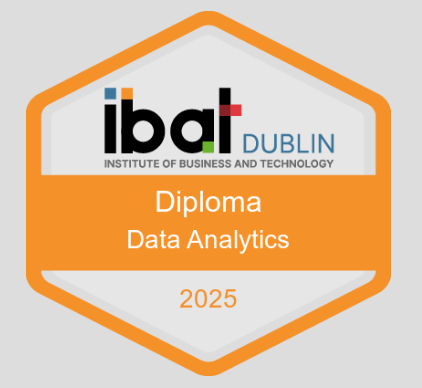- Why study Data Analytics?
- Course Overview
- Career Opportunities
- Entry Requirements
Why Data Analytics?
The Diploma in Data Analytics will aid your understanding of data models including how to extract, profile, clean, transform and present data, as well as teach you how to develop analytical skills to secure employment. You will be introduced to many popular techniques used in the field including the three main components of data analysis: understanding how data is stored and manipulated in databases (using MySQL and MySQL workbench), how to extract and present data using Microsoft Power BI, and how to develop predictive models using RapidMiner.
By the end of this programme, you will be able to create measures with DAX, optimise model performance, create reports for usability, enhance reports to expose insights, and perform advanced analysis.
As well as helping you become an expert in data analytics, this business data analysis course online will support you in your preparation for the Analysing Data with Microsoft Power BI exam. (Exam-Ref PL-300)
Graduates of this programme will be able to acquire more senior roles in their careers and roles with more responsibility such as strategist, analyst, and adviser. You will gain confidence to apply for roles that actively partner with management and operations functions to influence the direction and decisions of the business on a day-to-day basis.
Looking for data analytics courses online? Studying with IBAT will prepare you to work in some of the world’s largest firms, including Google, LinkedIn, Facebook, IBM, Apple, Pfizer, Twitter, and GlaxoSmithKline, that have European headquarters in Ireland and are always looking for data scientists.
Course Overview
This programme will introduce you to big and small data, teaching you how to manipulate, analyse, and interpret it in sophisticated ways and to present findings in a persuasive and influential manner. You will also learn how to identify situations in which predictive analytics can add value by better meeting customer needs through the smarter allocation of marketing budgets and by improving financial decisions.
Please Note: Although all techniques are based on the theory of statistics, this is not a statistics course. This course takes a logic-based approach rather than a formula-based one. It will not focus on helping you become knowledgeable on statistics but rather on knowing how to apply all techniques learned in a practical manner.
Students must use a Windows computer for this course. A Mac is fine as long as it is capable of running Windows.
Course Content
The course covers the following areas:
- Storing Data
- Working with SQL to store and retrieve data
- Preparing Data
- Power BI
- Modelling Data
- Power BI
- Visualising Data
- Power BI
- Analysing Data
- Power BI
- Building Predictive Models
- RapidMiner (Decision Trees, Confusion Matrix, Clustering, Text Analysis)
- Deploying Data Workflows
- Power BI
- Ethical Overview
- Microsoft Exam Overview
This course requires no programming skills.
Assessment
Participants will be required to successfully complete project work (100%) on real-world case studies and data sets.
What is a Professional Diploma?
An IBAT Professional Diploma is a focused, short-duration practical course that consolidates, upskills, and/or reskills learners in a professional area. It is a stand-alone qualification that does not lead to an award on the National Framework of Qualifications (NFQ).
Career Opportunities
Data analysts are in high demand in many industries, including pharmaceuticals, marketing, finance and insurance, and cloud computing. According to GoStudy Consulting and EdTech, the demand for a graduate in data analytics in Ireland has increased by 50% in the last five years (as of 2020). Graduates from Ireland are highly employable thanks to industry-led courses in med-tech, analytics, digital marketing, data engineering, data analytics, life sciences, ICT, pharma, and health care. According to Stoodnt, Ireland has more than 17,000 startups. As the amount of data and technological insights grows, organisations in Ireland are looking for talented analysts.
Entry Requirements
This programme is suited for individuals with a variety of different experience levels, and while there is no academic requirement for entry, all applicants should demonstrate an interest in and an aptitude for data analytics. Basic computer literacy is a requirement with a digital literacy certificate or equivalent.
It should be noted that while this is not a statistics course, all techniques taught are based on the theory of statistics. You will need to understand basic business statistical concepts, including mean/average, standard deviation and normal distribution.
Important notice: This Data Analytics course is primarily Windows-based due to extensive use of Power BI, which only runs on Windows. While a Mac can be used for approximately 40% of the course, a Windows computer or Windows environment is required for Power BI lectures.
Please note: Visas are not offered for any of our diploma courses.
Why Study at IBAT Dublin?
We are Ireland’s leading enterprise-focused third level institution with a special focus on how we guide, support, and mentor our students throughout their college experience and into their working lives.
We know that employers need graduates that can hit the ground running, so we’ve tailored our courses to prepare you to do just that. And if you need an extra hand, our Academic team equipped with years of lecturing and industry experience are ready to support you both in your professional and personal development.
Diverse Programmes
Take your pick of our wide range of courses, each designed with your future in mind.
Expert Tutors
Learn from industry professionals at the very top of their game.
Flexible Learning
Life happens. We get it. Study and achieve your goals on your schedule.
Central Location
Study at one of our two campuses placed in the heart of central Dublin.
Small Class Sizes
Get one-to-one, personalised support from our tutors.

Meet Our Students
Hear from our students as they share why they chose IBAT Dublin and the invaluable benefits they’ve gained from their journey with us.
Study options
You can attend lectures Online or On Campus, offering maximum flexibility with your time and how you learn.
Online Study
On Campus Study









